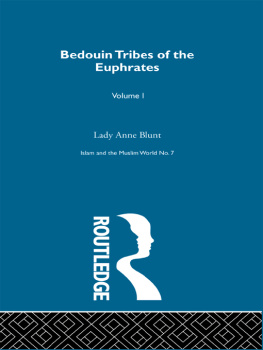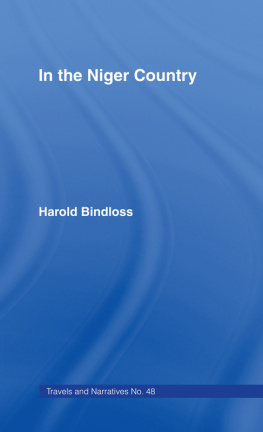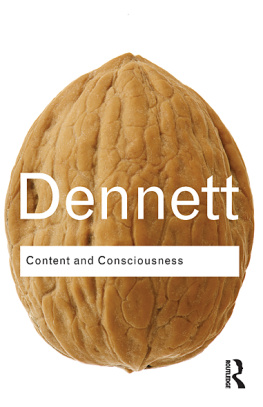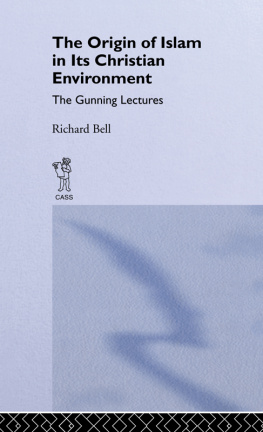Published by
FRANK CASS AND COMPANY LIMITED
2 Park Square, Milton Park, Abingdon, Oxon, OX14 4RN
First edition 1879
New impression 1968
Transferred to Digital Printing 2006
ISBN 0-7146-1978-7 (Set)
ISBN 0-415-41638-8 (hbk)
ISBN 0-415-41639-6 (hbk)
ISBN 978-1-136-99269-8 (ePub)
Publishers Note
The publisher has gone to great lengths to ensure the quality of this reprint but points out that some imperfections in the original may be apparent
Printed and bound by CPI Antony Rowe, Eastbourne
PLAIN OF MELAKH, AND RIVER EUPHRATES.
[Frontiepiece, Vol. I.
RUINS OF PALACE OF EL HADDR.
[Frontispiece, Vol. II.
BEDOUIN TRIBES OF
THE EUPHRATES.
BY
LADY ANNE BLUNT.
EDITED, WITH A PREFACE AND SOME ACCOUNT OF THE
ARABS AND THEIR HORSES,
BY W. S. B.
WITH MAP AND SKETCHES BY THE AUTHOR.
LONDON:
JOHN MURRAY, ALBEMARLE STREET.
1879.
[All rights reserved.]
Dedicated
TO
HIS HIGHNESS
NEWAB BAHADOOR EKBAL OOD DOWLEH,
THE ILLUSTRIOUS DESCENDANT OF
THE PRINCES OF OUDE.
PREFACE BY THE EDITOR.
AT the present moment, when all eyes are turned towards the East, and when Asia, long forgotten by the rest of the world, seems about to reassert itself and take its old place in history, the following sketch of what is actually going on, in one of its most famous districts, should not be without interest to the English public.
The Euphrates Valley is familiar to every one by name, as a future high-road to India; and we have it on the highest authority that its possession by a friendly power is vital to British interests. Schemes, too, are known to be on foot for running a railroad down it to the Persian Gulf, and advertisements have appeared, with maps on which such a line is already traced. Yet how few, even of those who write these things, have any acquaintance with the regions talked of or knowledge of the tribes which inhabit them!
The fact is, the Euphrates is more of a mystery to the general public than any river of equal importance in the old world. It has never been popularly described, and since the days of Xenophon, has hardly been described at all. With the exception of Colonel Chesney, who was commissioned by William the Fourth, in 1835, to survey the river, and who has given us two bulky volumes of statistics and an excellent chart as the results of his expedition, no traveller, as far as I am aware, has made a study of the district or narrated his adventures there in print. Till twenty years ago the Euphrates was a dangerous neighbourhood for Asiatics as well as Europeans. The nazeh were lords and masters of the river; and travellers were right in giving it a wide berth. But now the caravan road is a tolerably safe one, at least in the winter months; and there is no reason why some enterprising Cook should not lead his personally conducted parties from Aleppo to Bagdad as easily as from Dan to Beersheba. Still, I think I am not mistaken when I say that the author of these volumes is the first bon fide tourist who has taken the Euphrates road, and I make no apology for publishing her experience of it.
With regard to the Authors further adventures, and the account given by her of the Bedouin tribes of Mesopotamia and the western deserts, I shall also, I The desert has been usually to Europeans a sort of Tom Tiddlers ground, where, instead of seeking the tribes, it has been an object to slip by unseen. Circumstances have, in the present instance, changed the position; and the desert has been for a time the home of the traveller, as it is of the tribes themselves.
For my own share in this work (the chapters at the end of the second volume), I fear I have hardly so good a plea to urge. For twenty years resident at Bagdad, or for nine years engaged in missionary work in Syria, inscribed upon the title page, would, I know, enhance the value of what I have written; but this cannot be. Neither the author of the journal, nor I can lay claim to a more serious position towards the public than that of tourists, who have had the good fortune to see a little more than is generally seen, and to learn a few things more than are generally known. We left England with as little intention of instructing our fellow countrymen as travellers need have; and it was not until we saw that fortune had put us in the way of acquiring really valuable knowledge that we set ourselves seriously to work. At the same time I would remark that the value of labour done is not always in proportion to the time bestowed on it, nor even to the skill or courage of the performer. Chance often plays a considerable part in the most serious undertakings; and chance has favoured us here.
To begin with, our journey was made at an interesting moment, when the Bulgarian war was at its height, and when the strain on the resources of the Porte had so far relaxed the bonds of discipline in these outlying provinces, that the inhabitants were at their ease with us in speech and action. Then we had the singular good fortune to reap a whole harvest of information, which others had been preparing for years, in the very field we had chosen.
Again, in our visit to the Bedouin tribes, circumstances obliged us to go without escort, interpreters, or for the most part, guides, a position which, as it turned out, more than anything else predisposed those we came to see in our favour. There was no real danger in this, or real difficulty, but it was unusual; and the Bedouins fully appreciated the confidence shown in them. They became our friends. The Desert, last winter, like the rest of the world, was in confusion; and we were fortunate enough to be witnesses of a crisis in politics there, and of some episodes of a war. In these we could not help being interested; and the sympathy we felt in their troubles re-acted on our new friends and invited confidences which would hardly else have been made to strangers. We thus acquired, in a few weeks, more real knowledge of the Desert and its inhabitants than has often been amassed in as many years spent in the frontier towns of Syria.
This must be my excuse if, in the concluding chapters of this work, I have ventured to speak somewhat ex cathedr, and if I have allowed what was originally only to have been a journal, to assume a more pretentious garb. These chapters I am alone responsible for. They are an attempt to epitomise the information collected in the Desert; and, though I am far from vouching for the entire accuracy of my sketch of life and manners, and still less of the stories I have repeated, I can at least affirm that I have taken little from books, and much from direct sources.
I have added what I think will interest many,a sketch of Arab horse breeding, with a genealogical table of the descent of the thoroughbred Arabian horse.










